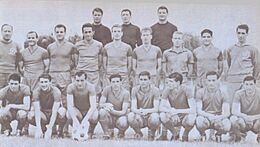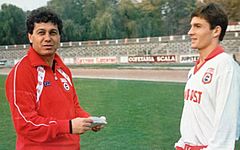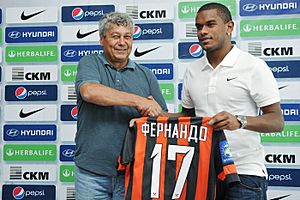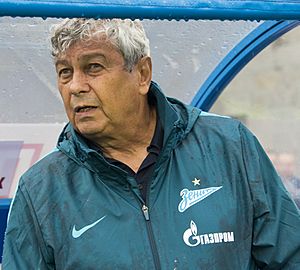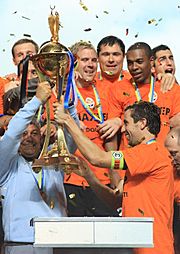Mircea Lucescu facts for kids
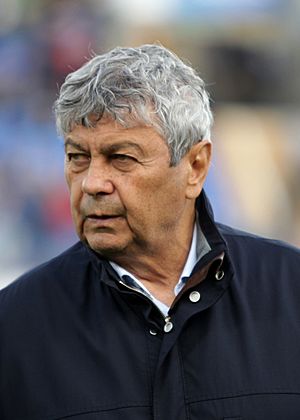
Lucescu in 2017
|
|||
| Personal information | |||
|---|---|---|---|
| Full name | Mircea Lucescu | ||
| Date of birth | 29 July 1945 | ||
| Place of birth | Bucharest, Romania | ||
| Height | 1.77 m (5 ft 10 in) | ||
| Position(s) | Winger | ||
| Team information | |||
|
Current team
|
Romania (head coach) | ||
| Youth career | |||
| 1961–1963 | Școala Sportivă 2 București | ||
| Senior career* | |||
| Years | Team | Apps | (Gls) |
| 1963–1977 | Dinamo București | 250 | (57) |
| 1965–1967 | → Știința București (loan) | 39 | (12) |
| 1977–1982 | Corvinul Hunedoara | 111 | (21) |
| 1990 | Dinamo București | 1 | (0) |
| Total | 401 | (90) | |
| International career | |||
| 1966–1979 | Romania | 70 | (9) |
| Managerial career | |||
| 1979–1982 | Corvinul Hunedoara (player/coach) | ||
| 1981–1986 | Romania | ||
| 1985–1990 | Dinamo București | ||
| 1990–1991 | Pisa | ||
| 1991–1995 | Brescia | ||
| 1995–1996 | Brescia | ||
| 1996 | Reggiana | ||
| 1997–1998 | Rapid București | ||
| 1998–1999 | Inter Milan | ||
| 1999–2000 | Rapid București | ||
| 2000–2002 | Galatasaray | ||
| 2002–2004 | Beşiktaş | ||
| 2004–2016 | Shakhtar Donetsk | ||
| 2016–2017 | Zenit Saint Petersburg | ||
| 2017–2019 | Turkey | ||
| 2020–2023 | Dynamo Kyiv | ||
| 2024– | Romania | ||
| *Club domestic league appearances and goals | |||
Mircea Lucescu (born 29 July 1945) is a famous Romanian football manager and former player. He is currently the head coach of the Romania national team. Many people consider him one of the most successful football managers ever.
As a player, Lucescu was very successful in the Romanian league. He won seven league titles with Dinamo București. He also played for Știința București and Corvinul Hunedoara. He played 70 games for the Romania national team and was their captain in the 1970 FIFA World Cup.
Lucescu has coached many teams in different countries. These include Romania, Italy, Turkey, Ukraine, and Russia. He is best known for coaching Shakhtar Donetsk for twelve years. There, he became the most successful coach in their history. He won eight Ukrainian Premier League titles, six Ukrainian Cups, seven Ukrainian Super Cups, and the 2008–09 UEFA Cup.
He also won trophies in Ukraine with Shakhtar's rival, Dynamo Kyiv. In Romania, he won league titles with Dinamo București and Rapid București. In Turkey, he won titles with Galatasaray and Beşiktaş.
Lucescu has won many awards for his coaching. He was named Romania Coach of the Year several times. He also won Ukraine Coach of the Year many times. In 2013, he received the Manager of the Decade award in Romania. By 2015, he was one of only five people to coach in 100 UEFA Champions League matches. He has won 38 official trophies, which ranks him third all-time.
Contents
- Playing Career Highlights
- International Football for Romania
- Coaching Career
- Starting at Corvinul Hunedoara
- Coaching the Romania National Team
- Success with Dinamo București
- Coaching in Italy: Pisa and Brescia
- Return to Rapid București and Inter Milan
- Success in Turkey: Galatasaray and Beşiktaş
- Shakhtar Donetsk: A Long and Successful Era
- Zenit Saint Petersburg and Turkey National Team
- Dynamo Kyiv and Return to Romania
- Personal Life
- Managerial Record
- Trophies and Awards
- See also
Playing Career Highlights
Mircea Lucescu was born in Bucharest, Romania, on 29 July 1945. He began playing football as a young player at Școala Sportivă 2 București. He joined Dinamo București and played his first top-league game on 21 June 1964. In his first two seasons at Dinamo, he helped the team win the championship.
He was then loaned to Știința București for two seasons. After returning to Dinamo, he won the Romanian Cup in 1968. He scored two goals in the final game. Dinamo reached the Cup final three more times, but lost to their rivals, Steaua București.
Lucescu won four more league titles with Dinamo. He played 250 games for Dinamo and scored 57 goals. He also played 15 games in European competitions, scoring three goals. He even scored against famous Spanish teams like Real Madrid and Atlético Madrid. In 1971, he was ranked fourth for the Romanian Footballer of the Year award.
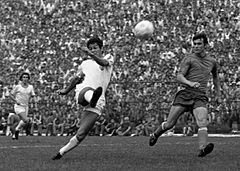
In July 1977, Lucescu moved to play for Corvinul Hunedoara. In January 1979, he became the team's coach while still playing. The team was relegated to the second division that season. However, Lucescu stayed and helped them get promoted back to the top league the next year. He retired from playing after the 1981–82 season.
He made a brief return to playing in 1990 when he was coaching Dinamo București. Many players were away with the national team. So, Lucescu played one game, becoming the oldest player to appear in a Romanian top-league match at 44 years old. He won the championship as both a player and a coach that season.
International Football for Romania
Lucescu played 64 games for the Romania national team and scored nine goals. He was captain in 23 of those games. He made his debut on 2 November 1966 in a win against Switzerland. He played in the qualifiers for the 1968 European Championship.
He also played in the successful 1970 World Cup qualifiers. At the final tournament in Mexico, he captained Romania in all three group matches. Romania did not advance past the group stage. For the last game against Brazil, Lucescu even bought the team's blue uniforms with his own money. This was because the Romanian Football Federation only provided yellow ones, which were the same color as Brazil's.
He played in the qualifiers for the 1972 European Championship. Romania reached the quarter-finals but lost to Hungary. His last game for the national team was on 4 April 1979 against Spain.
For representing his country at the 1970 World Cup, Lucescu received a special medal from the President of Romania in 2008.
Coaching Career
Starting at Corvinul Hunedoara
Mircea Lucescu learned a lot about coaching from Viorel Mateianu. He was very impressed by Mateianu's training methods. Lucescu started coaching while still playing for Corvinul Hunedoara in January 1979. His first match as coach was a cup game.
He made his top-league coaching debut a few days later, winning 2–0 and even scoring a goal himself. The team was relegated that season, but Lucescu stayed. He helped them get promoted back to the first division the next year. He then led Corvinul to a third-place finish in the 1981–82 season. He left to focus on coaching the national team. During his time at Corvinul, Lucescu was great at finding and developing young talented players.
Coaching the Romania National Team
Lucescu managed the Romania national team for 58 matches. He started on 11 November 1981. He led the team to qualify for Euro 1984. They won a tough qualification group that included 1982 World Cup winner Italy.
At the Euro 1984 tournament, Romania drew one game and lost two, not advancing from the group stage. He almost qualified the team for the 1986 World Cup. His last game as national team coach was a 4–0 win against Austria in September 1986. Lucescu also gave Gheorghe Hagi, a famous Romanian player, his debut for the national team when Hagi was just 18.
Success with Dinamo București
Lucescu became coach of Dinamo București in November 1985. In his first season, he won the Romanian Cup by beating their rivals, Steaua București. Over nearly five years, he built a strong team. He brought in young players from the club's youth academy and transferred other talented young players.
This team reached the quarter-finals of a European competition in 1989. The next season, they won the Romanian league title and the Romanian Cup. They also reached the semi-finals of another European competition.
Coaching in Italy: Pisa and Brescia
After the Romanian Revolution in 1989, Lucescu moved to Italy in July 1990. He coached Serie A club Pisa. He had some challenges with the club president but stayed for 24 games. The team was relegated at the end of the season. During this time, he coached young players like Diego Simeone. He also worked with a fitness trainer to create a new software for tracking player performance.
In July 1991, Lucescu signed with Serie B club Brescia. He helped them get promoted to Serie A in just one season. They were relegated the next season but promoted again the following year. Brescia also won the Anglo-Italian Cup during this period. When they were relegated again, Lucescu was fired. He was rehired but then dismissed again due to poor results. He brought several Romanian players to Brescia, and he even allowed a 15-year-old Andrea Pirlo to train with the senior team.
In July 1996, Lucescu coached Reggiana in Serie A. His time there was short, lasting only until November 1996, because of bad results.
Return to Rapid București and Inter Milan
In July 1997, Lucescu returned to Romania to coach Rapid București. He built a new team with young talents and experienced players he had coached before. This team won the Romanian Cup in 1998.
After a short time at Inter Milan, he came back to Rapid. He led them to win the Romanian league title in 1999, which was their first championship in 32 years. They also won the Romanian Supercup.
In December 1998, Lucescu became coach of Inter Milan in Italy. He worked with famous players like Ronaldo and Roberto Baggio. He led Inter to the quarter-finals of the Champions League in 1999. They were knocked out by Alex Ferguson's Manchester United, who went on to win the competition. He left Inter in March 1999.
Success in Turkey: Galatasaray and Beşiktaş
In June 2000, Lucescu took over as coach of Turkish club Galatasaray. With Romanian players Gheorghe Hagi and Gheorghe Popescu, he won the UEFA Super Cup in 2000, beating Real Madrid. Galatasaray reached the Champions League quarter-finals in 2001. The next year, Galatasaray won the Turkish League title. Despite winning the league, Lucescu was replaced at the end of the season.
Soon after leaving Galatasaray in June 2002, Lucescu joined their rivals, Beşiktaş. The year 2003 was important for Beşiktaş as it was their 100th anniversary. Lucescu led them to win the Turkish title with a record number of points. They also reached the quarter-finals of the UEFA Cup.
The next season, Beşiktaş did not do well in the Champions League. Lucescu left the club after they finished third in the league. He felt that the championship was "stolen" due to unfair referee decisions.
Shakhtar Donetsk: A Long and Successful Era
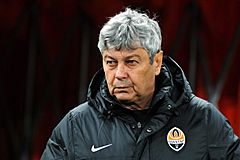
In May 2004, Lucescu joined Ukrainian team Shakhtar Donetsk. He led them to become a very strong team in Ukraine over the next years. His first trophy with them was the Ukrainian Cup in 2004. In his first full season, he won the Premier League title.
The next season, he won both the Premier League and the Super Cup. In the 2007–08 season, he won both the Premier League title and the Ukrainian Cup. In the 2008–09 season, he guided Shakhtar to their first-ever European trophy, winning the last UEFA Cup. They won the final against Werder Bremen 2–1 after extra time.
Shakhtar won the Premier League title again in 2010. The 2010–11 season was very successful. Lucescu led Shakhtar to win three domestic trophies: the Premier League, the Ukrainian Cup, and the Super Cup. They also had their best Champions League run, reaching the quarter-finals before losing to Barcelona.
In the 2011–12 season, Shakhtar won the Premier League and Ukrainian Cup again. This gave Lucescu his sixth Premier League and fourth Ukrainian Cup with the club.
In 2009, Lucescu received a special award from the President of Romania. He was also named an "Honorary citizen of Donetsk" for his achievements. He won the Coach of the Year award in Ukraine many times between 2006 and 2014.
He led Shakhtar to the Europa League semi-finals in his last season. He announced his resignation in early 2016, ending his 12 years at Shakhtar. He became the club's greatest manager. In his final match, he won the Ukrainian Cup. During his time at Shakhtar, he often relied on talented young Brazilian players.
Zenit Saint Petersburg and Turkey National Team
On 24 May 2016, Lucescu signed a two-year deal with Russian club Zenit Saint Petersburg. He was dismissed about a year later. Zenit finished third in the league and did not qualify for the Champions League. However, he did win the Russian Super Cup in 2016.
On 2 August 2017, he became the new head coach of the Turkey national team. His first match was a 2–0 loss to Ukraine. The team did not qualify for the 2018 World Cup. In November 2018, Turkey was relegated in the UEFA Nations League. His contract was ended by agreement in February 2019.
Dynamo Kyiv and Return to Romania
On 23 July 2020, Lucescu returned to Ukraine. He signed a two-year contract with Dynamo Kyiv, the main rival of his former club Shakhtar Donetsk. This move caused some controversy among Dynamo Kyiv fans because of his long history with Shakhtar. He even tried to resign after a few days, but the club convinced him to stay.
On 20 October, in Dynamo Kyiv's first Champions League match of the season, Lucescu became the oldest manager to coach a game in the competition. He was 75 years and 83 days old. Lucescu won his first league title with Dynamo Kyiv on 25 April. On 13 May, he secured the double by winning the Ukrainian Cup.
In February 2022, Lucescu was living in Kyiv when Russia invaded Ukraine. He initially wanted to stay. However, he left for his home country on the advice of the Romanian embassy. This also helped Dynamo's foreign players get to safety.
On 3 November 2023, Lucescu announced he would step down as Dynamo Kyiv's manager. This was after a 1–0 home loss to Shakhtar Donetsk.
On 6 August 2024, Lucescu returned as the head coach of the Romania national team. This was 38 years after his first time coaching them. His first match back was a 3–0 away victory against Kosovo in the Nations League.
Personal Life
Mircea Lucescu is a polyglot. This means he speaks many languages. He can speak English, Portuguese, Spanish, Italian, French, and Russian. Of course, he also speaks his native Romanian. He often tells his players that reading books or going to the theatre is better than going to clubs. He also encouraged his players to go to university. His son, Răzvan Lucescu, was also a footballer and is now a manager.
In July 2009, Lucescu had a heart problem and needed emergency surgery. On 6 January 2012, he was in a car accident in Bucharest and was seriously hurt.
Managerial Record
| Team | Country | From | To | Record | |||||||
|---|---|---|---|---|---|---|---|---|---|---|---|
| G | W | D | L | GF | GA | GD | Win % | ||||
| Romania | 1 November 1981 | 2 October 1986 | 58 | 24 | 19 | 15 | 77 | 63 | +14 | 41.38 | |
| Dinamo București | 1 November 1985 | 30 June 1990 | 177 | 132 | 28 | 17 | 494 | 167 | +327 | 74.58 | |
| Pisa | 1 July 1990 | 11 March 1991 | 24 | 8 | 5 | 11 | 32 | 49 | −17 | 33.33 | |
| Brescia | 1 July 1991 | 19 February 1995 | 151 | 47 | 59 | 45 | 197 | 188 | +9 | 31.13 | |
| Brescia | 1 July 1995 | 25 February 1996 | 29 | 7 | 9 | 13 | 32 | 36 | −4 | 24.14 | |
| Reggiana | 1 July 1996 | 25 November 1996 | 13 | 1 | 4 | 8 | 13 | 22 | −9 | 7.69 | |
| Rapid București | 1 July 1997 | 25 November 1998 | 57 | 41 | 11 | 5 | 122 | 42 | +80 | 71.93 | |
| Inter Milan | 1 December 1998 | 21 March 1999 | 17 | 4 | 4 | 9 | 26 | 26 | +0 | 23.53 | |
| Rapid București | 1 April 1999 | 30 June 2000 | 49 | 32 | 9 | 8 | 103 | 49 | +54 | 65.31 | |
| Galatasaray | 1 July 2000 | 30 June 2002 | 106 | 64 | 22 | 20 | 210 | 111 | +99 | 60.38 | |
| Beşiktaş | 1 July 2002 | 17 May 2004 | 89 | 53 | 19 | 17 | 162 | 98 | +64 | 59.55 | |
| Shakhtar Donetsk | 17 May 2004 | 24 May 2016 | 573 | 395 | 90 | 88 | 1,220 | 452 | +768 | 68.94 | |
| Zenit Saint Petersburg | 24 May 2016 | 28 May 2017 | 40 | 25 | 7 | 8 | 74 | 34 | +40 | 62.50 | |
| Turkey | 2 August 2017 | 11 February 2019 | 17 | 4 | 6 | 7 | 17 | 25 | −8 | 23.53 | |
| Dynamo Kyiv | 23 July 2020 | 3 November 2023 | 126 | 70 | 21 | 35 | 216 | 126 | +90 | 55.56 | |
| Romania | 6 August 2024 | present | 10 | 8 | 0 | 2 | 26 | 7 | +19 | 80.00 | |
| Total | 1,537 | 916 | 313 | 308 | 2,924 | 1,396 | +1528 | 59.60 | |||
Trophies and Awards
As a Player
Dinamo București
- Divizia A (Romanian League): 1963–64, 1964–65, 1970–71, 1972–73, 1974–75, 1976–77, 1989–90
- Cupa României (Romanian Cup): 1967–68
Corvinul Hunedoara
- Divizia B (Romanian Second League): 1979–80
Individual Awards
- Romanian Footballer of the Year (fourth place): 1971
As a Manager
Corvinul Hunedoara
- Divizia B (Romanian Second League): 1979–80
Dinamo București
- Divizia A (Romanian League): 1989–90
- Cupa României (Romanian Cup): 1985–86, 1989–90
Brescia
- Serie B (Italian Second League): 1991–92
- Anglo-Italian Cup: 1993–94
Rapid București
- Divizia A (Romanian League): 1998–99
- Cupa României (Romanian Cup): 1997–98
- Supercupa României (Romanian Supercup): 1999
Galatasaray
- Süper Lig (Turkish League): 2001–02
- UEFA Super Cup: 2000
Beşiktaş
- Süper Lig (Turkish League): 2002–03
Shakhtar Donetsk
- Ukrainian Premier League: 2004–05, 2005–06, 2007–08, 2009–10, 2010–11, 2011–12, 2012–13, 2013–14
- Ukrainian Cup: 2003–04, 2007–08, 2010–11, 2011–12, 2012–13, 2015–16
- Ukrainian Super Cup: 2005, 2008, 2010, 2012, 2013, 2014, 2015
- UEFA Cup: 2008–09
Zenit Saint Petersburg
- Russian Super Cup: 2016
Dynamo Kyiv
- Ukrainian Premier League: 2020–21
- Ukrainian Cup: 2020–21
- Ukrainian Super Cup: 2020
Individual Awards
- Gazeta Sporturilor Romania Coach of the Year: 2004, 2010, 2012, 2014, 2021
- Ukrainian Premier League Manager of the Month: March 2021, April 2021, May 2021
Special Honors
- Order of Merit (Ukraine) III degree (2006)
- Order of The Sportive Merit (Romania) III degree (2008)
- Order of the Star of Romania (2009)
- Order of Merit (Ukraine) II degree (2009)
- Order of Merit (Ukraine) I degree (2011)
- Honorary Citizen of Donetsk
See also
 In Spanish: Mircea Lucescu para niños
In Spanish: Mircea Lucescu para niños
 | Mary Eliza Mahoney |
 | Susie King Taylor |
 | Ida Gray |
 | Eliza Ann Grier |


